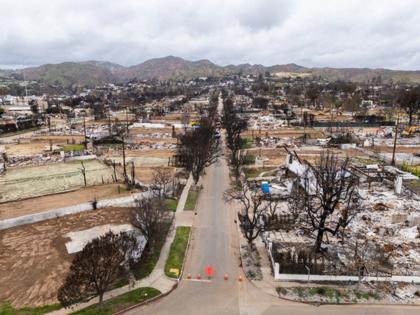Property owners sue California insurance companies over alleged 'collusion' following wildfires
Published in News & Features
LOS ANGELES — A group of property owners affected by the January wildfires is suing major California insurer carriers, including the state’s largest, State Farm, for allegedly violating California’s antitrust and unfair competition laws.
The lawsuits follow others regarding insurers’ handling of the aftermath of the Eaton and Palisades fires, including against Insurance Commissioner Ricardo Lara and the California FAIR Plan (specifically about smoke damage), the state’s beleaguered insurance plan of last resort.
The group complaint and demand for jury trial filed on April 19 in the Los Angeles Superior Court alleges that in a “nefarious conspiracy,” major insurers conspired to “eliminate competition between them,” thereby “intentionally and systematically” forcing homeowners to accept the California FAIR Plan.
On the same day, lawyers filed a separate class action lawsuit alleging the same thing.
“Insurance is a product that homeowners hope never to need, but rely on for peace of mind in normal times and for critical help rebuilding after a catastrophe,” Michael J. Bidart of Shernoff Bidart Echeverria LLP, one of the law firms representing the plaintiffs, said in a statement. “The complaints allege that, by colluding to push plaintiffs and so many like them to the FAIR Plan, the defendants have reaped the benefits of high premiums while depriving homeowners of coverage that they were ready, willing, and able to purchase to ensure that they could recover after a disaster like January’s wildfires.”
Representatives of the major insurance companies meet regularly to “discuss issues that we would consider to be market issues,” including the administration of the FAIR Plan, said Jamie Court, president and chairman of the board of Consumer Watchdog, a Santa Monica-based, progressive nonprofit. “This was clearly a concerted attempt by the entire industry to push people in high risk areas to lower benefit policies, and at the same time keep collecting higher premiums from everyone else.”
The FAIR Plan was established in the wake of the 1965 Watts riots, after fleeing insurers highlighted the need for a new type of carrier. The goal was to provide an insurance option for California homeowners living in places that open-market carriers refused to cover — including in communities vulnerable to wildfire.
The FAIR Plan has its own reserves, but is backstopped by California’s licensed property insurers, which are required to pay claims when FAIR runs through its funds. The plan has proved pivotal due to increasingly disastrous fires in the state, including after the 2018 Camp fire that destroyed the town of Paradise and cost insurers $12.5 billion.
However, with many insurers canceling coverage for homeowners in fire-risk zones, the FAIR plan has become overwhelmed. The number of FAIR Plan policyholders has skyrocketed from about 200,000 residential policyholders in 2020 to nearly 560,000 as of March 2025. The plan has estimated that it will lose $4 billion on claims related to the January fires in L.A., draining its reserves and reinsurance.
In response, Lara signed a policy put in place last year which allows the FAIR Plan to assess its member companies $1 billion for residential claims. Those private insurers can then temporarily add surcharges to the premiums paid by their own policyholders to recoup 50% of that, or $500,000.
Those increases in premiums apply to homeowners everywhere in California — not just fire-prone areas. That said, Lara must approve those surcharges separately.
Opponents of the policy call it an industry “bailout” that burdens consumers.
“Homeowners across the state should not be on the hook for the L.A. fires because insurance companies abandoned those neighborhoods and dumped homeowners on the FAIR Plan,” Carmen Balber, executive director of Consumer Watchdog told the Los Angeles Times in January.
The new suits allege that the state’s top insurers — those required by law to back FAIR — colluded together to cancel plans, leaving homeowners underinsured under FAIR, which has higher premiums than most plans on the commercial market, yet is capped at the lower coverage limit of $3 million. The plaintiffs are seeking three times the damages each have sustained.
“This is exactly the type of action that needs to happen for us to break up what is clearly cartel-like behavior,” said Court.
As of publication, representatives from State Farm and Allstate did not respond to requests for comment.
Hilary McLean, a spokesperson for the FAIR Plan, told The Times that “while the California FAIR Plan is not named in these lawsuits, the FAIR Plan does not comment on active litigation.”
Gabriel Sanchez, representing Lara’s office, said in an email, “The Department of Insurance is not involved in this matter as a party and cannot comment on the lawsuit. Our focus is, and always will be, protecting California consumers.”
Earlier this month, State Farm proposed a 17% emergency rate hike— down from an initial 22% request to state officials in February — that it said is necessary to “help stabilize State Farm General’s financial position” and prevent the carrier from having to “further constrain” its ability to provide home insurance in California.
Meanwhile, many who lost their homes in the L.A. fires are calling for a formal government investigation of major insurance providers, alleging that delays and denials have kept them in dire financial straits and housing limbo.
(Staff writer Laurence Darmiento contributed to this report.)
©2025 Los Angeles Times. Visit at latimes.com. Distributed by Tribune Content Agency, LLC.







Comments